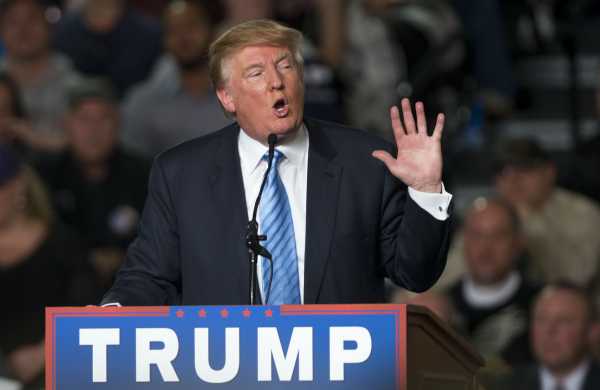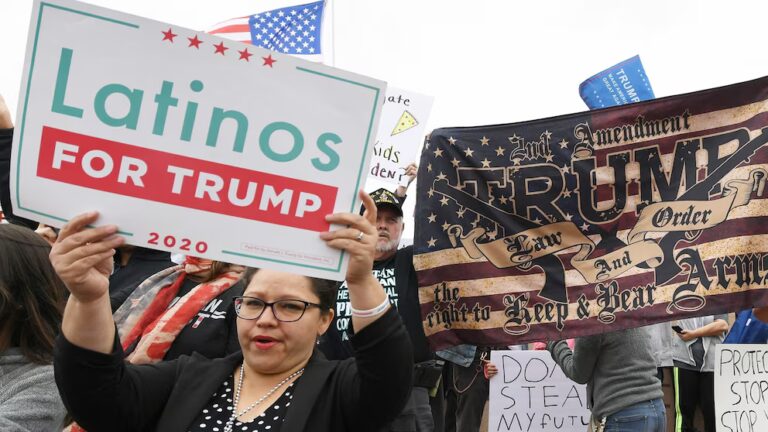

Outside contributors’ opinions and analysis of the most important issues in politics, science, and culture.
President Donald Trump’s proposal to end birthright citizenship — a policy that guarantees that any child born on US soil has guaranteed American citizenship regardless of the status of their parents — would deny citizenship to children born to undocumented migrants. The move has a political and a legal logic; the first is familiar and pernicious, the second novel and flawed.
The political logic is simple: Announce something beyond the constitutional and political pale. Wait for liberals, including scholars like me, to complain. Then pivot back to the conservative base by blaming the left for its obstructionism. This lather-rinse-and-repeat cycle is especially useful at moments when there is other bad news to obfuscate.
Given that logic, the best approach might be to ignore Trump’s trial balloon (so stop reading!). Yet such proposals — think of the travel ban — have had a nasty habit of bearing fruit under the Trump administration. If such a policy were to go through, it would upend countless families and disrupt many lives. Hence, let’s consider the proposed legal logic.
Trump’s legal argument for ending birthright citizenship
Trump has brought up ending birthright citizenship before. The president’s former Deputy National Security Adviser Michael Anton anticipated and argued for Trump’s proposal in two recent opinion articles, supplying the legal arguments the president’s comments lack.
Anton’s arguments, however, are strikingly weak even on their own terms. I am not an “originalist” who thinks the Constitution can be boiled down to what the framers believed. But I will accept those terms for the purpose of airing the argument’s deep flaws.
The 14th Amendment opens by declaring that “All persons born or naturalized in the United States and subject to the jurisdiction thereof, are citizens of the United States” The argument for excluding the children of undocumented migrants, as Vox’s Dara Lind explained, turns on the caveat in the line “subject to the jurisdiction thereof.” But what does that mean?
According to Anton, the phrase “subject to the jurisdiction of” reaches only those children “not subject to some foreign power,” On this view, a “foreigner clearly owes allegiance to somebody else: the country to which he is a citizen or subject” — which suggests then that a child with foreign parents has some innate allegiance to the country that their parents are from. The Trump proposal assumes that this includes the children of undocumented migrants, although apparently not the children of lawful immigrants.
Does the idea that undocumented migrants’ children are not “subject to the jurisdiction of the United States” since they are “subject to some foreign power” make lexical or historical sense? For four reasons, I think not.
The history of birthright citizenship must be considered
First, notice that it is not the child with a claim to birthright citizenship who is supposed to have an “allegiance to a foreign power.” It is their undocumented parent. The argument thus rests on a sleight of hand. It takes the status of the parent and uses it to legally punish their son or daughter.
This is question-begging: Not all the children born in the US to undocumented migrants are necessarily citizens of the country their parents came from. Other nations have very diverse citizenship regimes. Many refugees, in fact, are “stateless” because they fall within the gaps of different countries’ citizenship rules.
Second, Anton rightly concedes that the birthright citizenship clause was intended “to settle forever the question of the citizenship status of freed slaves and of other free blacks,” and so has “nothing whatsoever” to say about “the children of illegal immigrants.”
But a birthright citizenship clause excluding “the children of illegal immigrants” would not have “settle[d]” the status of freed slaves. Instead, it would have left an untold and uncertain number subject to the vagaries of statelessness and racist caprice.
After Congress outlawed the importation of Africans in 1807, slaves continued to be brought illegally across the Atlantic. As the historian Warren Howard has documented, large numbers of slavers operated out of the American powers. In 1859, President James Buchanan even flagged the illegal trade in his annual message to Congress.
At the time of the 14th Amendment, therefore, there were untold thousands (or more) children and grandchildren of “illegal immigrants” among the former slaves.
But no one at the time, or since, has suggested that their entry into the United States in clear violation of federal law robbed their children of birthright citizenship. At least until now. If the 14th Amendment’s birthright citizenship was to have had its intended (and, in fact, historically observed) effect, it cannot exclude the children of the undocumented.
Third, the excision of the children of the undocumented is at odds not just with the original understanding of the 14th Amendment. It is also at war with its purpose.
All agree that the amendment repudiated the Supreme Court’s infamous Dred Scott decision. That opinion excluded blacks from citizenship on the ground that the framers would have considered them “a subordinate and inferior class of beings.”
The 14th Amendment was thus intended to foreclose the invocation of “original intent” to arbitrarily and cruelly close the door of citizenship based on perception that one group is “subordinate and inferior.”
Perversely, Trump’s proposal does precisely that. Worse, it imposes no constraint on future Congresses’ powers to manipulate immigration law to exclude yet other disfavored groups, including lawful permanent residents and other lawfully present immigrants. It thus recreates the status quo that the amendment was meant to repudiate.
An end to birthright citizenry is not impossible
Finally, the logic of Anton’s position, as echoed by Trump, is that “allegiance to a foreign power” strips a newborn of birthright citizenship. But the most obvious index of such allegiance is hardly your parents’ immigration status: It is surely your entitlement to another nation’s citizenship.
By this logic, it would seem that those born with another nation’s citizenship—a strong index of “allegiance to a foreign power”—ought not to be U.S. citizens by birthright. But many countries vest citizenship with certain persons at birth, as the U.S. does for the children of two American parents born overseas. All children born in the U.S. with a claim to another nation’s citizenship would be excluded from birthright citizenship, if we take the logic at face value.
I hope it goes without saying that this result is highly objectionable, since it would lead to the deprivation of birthright citizenship as a consequence of one’s parents’ origins. Yet I think it follows logically and directly from Trump’s position. It is an implication that can be denied only by rejecting the irrevocably tainted project of taking away the birthright citizenship based on the alleged crimes of a parent.
All that said, it is important to recall that a Muslim ban of the sort that candidate Trump proposed seemed utterly scandalous and unlawful at first blush. Yet the administration followed through and ultimately won in the Supreme Court, creating a new and dangerous executive power to discriminate.
Those who are troubled by the idea of repudiating the 14th Amendment should be alert to the risk that White House lawyers will not be bothered by the Constitution’s vesting of the power to decide citizenship rules in Congress, and will gin-up a theory about why a statute already authorizes the president to do this.
We should be cautious, take this threat to basic American values seriously, and be prepared to fight back when reacting to Trump’s birthright citizenship proposal.
Aziz Huq teaches at the University of Chicago law School. His book “How to Save a Constitutional Democracy” was just published.
The Big Idea is Vox’s home for smart discussion of the most important issues and ideas in politics, science, and culture — typically by outside contributors. If you have an idea for a piece, pitch us at [email protected].
Sourse: vox.com






